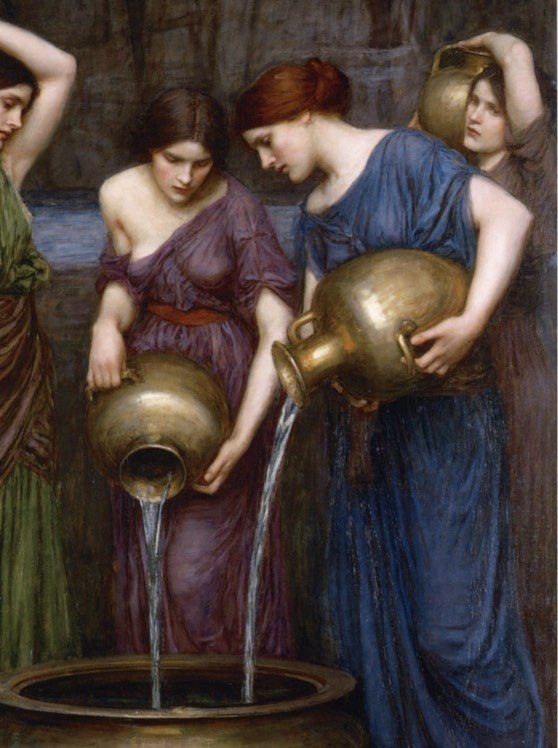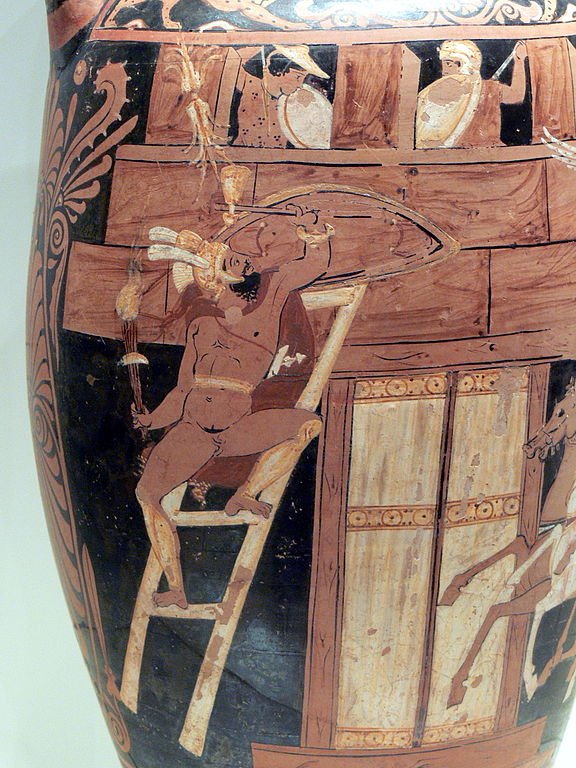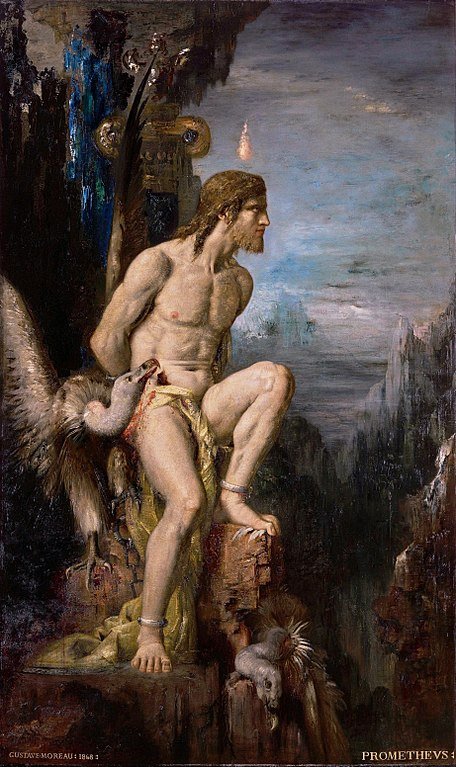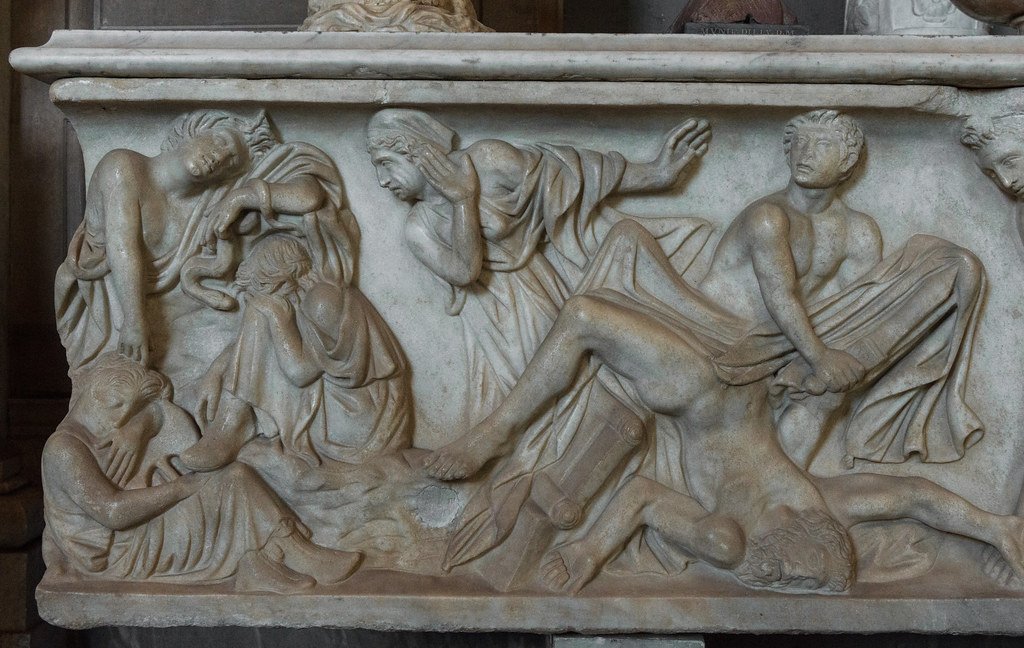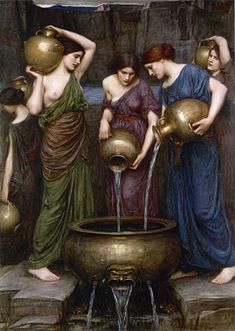
Suppliants
Suppliants by Aeschylus
Most probably first performed in 463 BC, Aeschylus’ Suppliants is the first play of a trilogy dealing with the destiny of the Danaids. It was probably the first part of a trilogy which also included Egyptians and The Daughters of Danaus, plays we know almost nothing about. In The Suppliants, Danaus and his daughters disembark on the shore of Argos asking the local king Pelasgus for protection from their cousins, the sons of Aegyptus, who forcefully want to marry them. After some consultation with his people, Pelasgus agrees to shelter his guests, even though he knows that this would probably lead to a devastating war with Egypt. His worst fears come true after an Egyptian party arrives at the shore of Argos and threatens to come back with an army if Pelasgus doesn’t hand over them the Danaids. Once again, the king of Argos chooses war over betrayal.
Date and Historical Background
Due to its archaic structure and the Chorus’ dominant role, for centuries it was believed that Suppliants is Aeschylus’ – and, thus, Ancient Greece’s – earliest play to survive.
However, a very damaged papyrus discovered in 1952 strongly suggests a much later date (the text is corrupted where the ruling archon/year should be given), as it states that Suppliants was part of a trilogy which won the first prize for tragedy at the City Dionysia ahead of a production by Sophocles. Since we know for a fact that Sophocles’ first competition entry was in 468 BC, Aeschylus’ Suppliants couldn’t have been performed before that year. Many years have been proposed by scholars since this discovery, with 463 BC being the favored one.
Most scholars believe that Suppliants was the first part of a trilogy, which also included Egyptians as the second play and The Daughters of Danaus as the third one; the tragic trilogy was followed by a satyr-play titled Amymone.
Characters and Setting
Characters
• Danaus, father of the Danaids and brother of Aegyptus, the king of Egypt
• Pelasgus, the king of Argos
• Herald of the Egyptians
• Main Chorus of the Daughters of Danaus, the Danaids
• Second Chorus of Egyptians
• Third Chorus of the Men of Argos
Setting
The play is set on the shore near Argos, where Danaus and his daughters arrive at the beginning of the play; in the background, there’s a sacred mound with an altar and images of all the city’s gods.
Summary of Suppliants
Parodos (Entrance Song)
Danaus and his daughters get off on the coast of Argos after fleeing Egypt.
We are immediately informed by one of the Suppliants of the reasons for the flight: “not because of some public decree pronounced against blood crime, but because of our own act to escape the suit of man, since we abhor as impious all marriage with the sons of Aegyptus.”
Argos is not chosen at random: the Danaids claim that they are Argive descendants since they are great-great-great-granddaughters of Io, the daughter of Argos’ first king Inachus, and one of the most famous of all Zeus’ lovers.
First Episode
Danaus and the Danaids claim sanctuary at the Argive altar on the shore, believing that they deserve protection both as suppliant refugees and as Argive descendants.
They explain this to Pelasgus, the king of Argos, as soon as he confronts them with a question about their foreign attire and their exotic looks. After hearing them out, Pelasgus’ buys their story, but is, nevertheless, hesitant as to whether he should help them or not. Rejecting their pleas may invoke the wrath of Zeus who protects all suppliants, but giving them shelter would certainly lead to a war with Egypt.
Pelasgus reasons that this is a much too important decision to make it himself, so he decides to consult and gain the approval of his people. The Danaids send him and their father to the Argive people’s assembly with a song and a final appeal; they even threaten to hang themselves if their prayers are not answered.
The first episode ends with a choral ode (the first stasimon) in which the Danaids celebrate the good will of Zeus and revisit the life and ordeals of their ancestress Io.
Second Episode
After some time, Danaus returns to the altar with some happy news: Pelasgus has persuaded his people to protect the Danaids, and they are even ready to wage war against Egypt if that’s what it takes to defend their honor.
Another choral song follows (the second stasimon) in which the Danaids shower praises and countless blesses on Pelasgus and the Argive people.
Third Episode
Almost immediately after sharing the happy news with his daughters, from the top of the sacred mound, Danaus notices an Egyptian ship nearing the shore. Instantly he rushes off to Pelasgus, ensuring his daughters that everything will work out fine in the end.
They are not so sure: in their fourth choral song (the third stasimon), the Danaids weep over their destiny and swear that they’d rather die than allow the Egyptians to take them by force back to Africa.
Fourth Episode
The Egyptians (a second Chorus) disembark on the shore, and their Herald orders the Danaids to step away from the altar and climb aboard their ships, threatening them that if they don’t agree to this proposal on their own accord, they will be taken against their will.
Fortunately, Pelasgus arrives with an army just on time. “If you so much as touch them,” he yells at the Herald, “you will regret it, and right soon.” The Egyptians back off, but not without another threat: “I think we are about to involve ourselves in a new war,” shouts the Herald as he leaves.
Exodos (Exit Song)
Relieved, the Danaids express their gratitude to Pelasgus and ask their father for further advice; Danaus commands his daughters to bring no shame upon him or their hosts by remaining chaste and unmarried as long as they are there. The Danaids promise to do so.
However, a third chorus, comprising Men of Argos, warns them that it may not be that smart of a decision to pledge allegiance to Artemis and spurn Aphrodite. Marriage has been the natural and inevitable destiny for almost all women, they say, and why should the Danaids be an exception?
A Brief Analysis
Since Suppliants was (most probably) the first part of a thematic trilogy, it is not at all surprising that it lacks a denouement. However, we do know what might have happened in the following two plays: Pelasgus was killed by the Egyptians who subsequently forcefully married the Danaids; advised by their father, all of the Danaids (save one, named Hypermestra) killed their husbands on their bridal night; Hypermestra was tried and convicted, but Aphrodite saved her and blessed her marriage; on the advice of the goddess, all of her sisters were afterward remarried to Argive men, thus fulfilling the warning with which Suppliants ends.
To a modern reader, this may seem like an anticlimactic ending, especially in view of a powerful feminist-sounding cry uttered by the Danaids in the middle of the first episode: “May I never be subject at all to the power of men!” The ending of Suppliants is not the only one which undoubtedly suggests that this attitude is just too hubristic: a fragment from The Daughters of Danaus has Aphrodite glorifying the benefits and holiness of loving matrimonies.
In addition to reaffirming the procreative function of marriage, Suppliants and its accompanying plays serve a political function as well. Written at a crucial time for Athens, the plays both celebrate the benefits of democracy (though a king, Pelasgus consults his people before making a final decision), and, through the story of Io (a Greek woman who gives birth to the Egyptian civilization) unabashedly advocate Greek cultural predominance to Egypt, at a time when authors such as Herodotus started to suggest that Greek’s religion and culture owes quite a bit to Egypt’s.
Suppliants Sources
There are many translations of Suppliants available online, both in verse and in prose; if you are a fan of the latter, you can read Herbert Weir Smyth’s translation for the Loeb Classical Library here. If, however, you prefer poetry, feel free to delve into Gilbert Murray’s rhymed adaptation here.
See Also: The Danaids, Oresteia, Seven Against Thebes, Prometheus Bound
Suppliants Video
Suppliants Associations
Link/Cite Suppliants Page
Written by: The Editors of GreekMythology.com. GreekMythology.com editors write, review and revise subject areas in which they have extensive knowledge based on their working experience or advanced studies.
For MLA style citation use: GreekMythology.com, The Editors of Website. "Suppliants". GreekMythology.com Website, 09 Apr. 2021, https://www.greekmythology.com/Plays/Aeschylus/Suppliants/suppliants.html. Accessed 26 April 2024.


